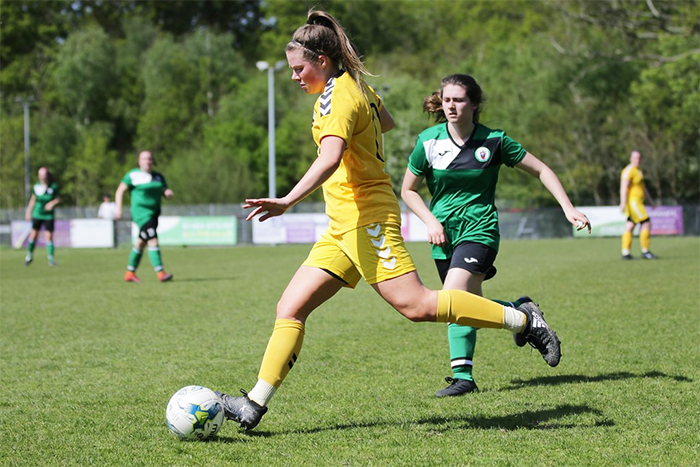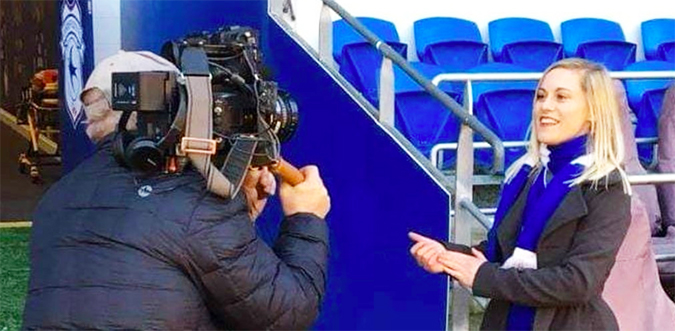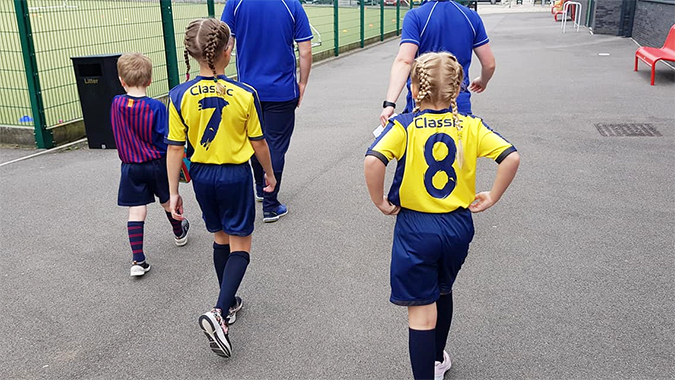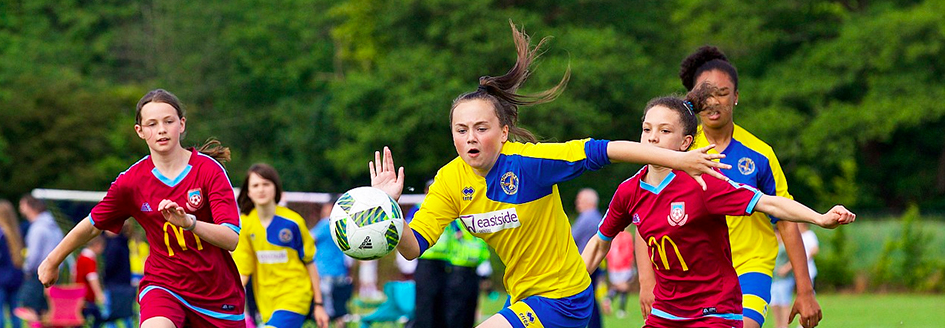With reports of young girls facing abuse for playing football on the rise, is sexism still stopping young women in Wales from getting involved in the game?
She’s running across the pitch, face red and eyes wide, when the centre-back boots the ball to her. Yes, she thinks. Here we go… She dashes towards the box, but she’s suddenly toe-to-toe with the opposing midfielder. She just needs to-
“Lesbian!”
She pauses, hesitates. Ignore it. Keep going. Block out the noise. But she can’t – suddenly the midfielder steals the ball and she can’t chase him down. They score. 1-0.
Last year, thirteen-year-old Darcie Barrie received national media attention for sparking discussion around sex-segregation in sports. Since Darcie was eight years old, she’s dreamed of becoming a professional footballer, but her fellow players at Torfaen, along with their parents, have given her a hard time for daring to play with the boys. “A few months ago, I tackled one of the boys and heard a parent shout: ‘Why are you getting tackled by a girl?” Darcie told the Telegraph. “It makes me feel a bit insecure. It’s quite horrible hearing it from other people.”

With charity Women in Football reporting a 400% increase in reports of sexism in 2018, Darcie’s story is clearly not an isolated incident. Many other young female footballers in Wales are facing criticism and name-calling for daring to play a ‘boys’ sport’. “Because I’ve got short hair, when I started playing football a lot of people would shout nasty things at me.” says Nanw, who played for Danescourt FC until she turned 12.
They’d shout at me when I was on the pitch, calling me a lesbian or saying I was a boy even though they knew I was a girl. One coach actually shouted at his players ‘Come on boys, she’s only a girl!’
Nanw, Fairwater Girls
The Women in Football report revealed that over 25% of the incidents happened on matchdays, but it seems that female players are facing sexist abuse everywhere, not just on the football pitch. “I was playing football outside my house last summer,” says Arwen, who plays for Thornhill FC, “When one of the builders working on the house next-door shouted down at me ‘girls can’t play football!’ and asked me ‘how many keepie-uppies can you do then?’ Even though I proved him wrong, and did about twenty in a row, it was still quite scary and frustrating that I had to prove myself.”
Almost half of all girls in the UK have faced harassment or abuse on social media, according to charity Plan International. Because we’re living in this digital age, it seems even harder for female players to escape this harassment. “I was bullied by a gang of boys at school for playing football,” says Kayleigh, who now plays for the Cardiff Bluebelles. “They would comment on any pictures of me playing football, saying ‘get back in the kitchen’ or that I was ‘pathetic’. It was really hard to ignore them because not only did I see them every day in school, but they could carry on picking on me once they got home too.”

The Women in Football 2018 study also revealed that reports of sexist incidents on social media had risen by 285.4%, and that ‘trolling’ – posting public comments with the sole intention of causing distress or upset – was becoming a serious issue in the football world. Bethan Phillips is an avid Cardiff City FC fan, and presents post-match analysis segments for social media. “Every time I post a video, I get so many comments from men criticising me,” she says. “They usually ask me ‘what the hell do you know about football?’ or call me a fake fan, and I honestly don’t see male presenters being treated in the same way. It is sexism, and it’s really disheartening.”
It’s hard to believe that people are still rejecting women from the footballing community, especially as the women’s game has seen so much media attention this year. The 2019 World Cup certainly raised the profile of the women’s game, with England’s semi-final defeat against the US breaking the record for women’s football in the UK with 11.7m viewers. “Although events like the World Cup show how great girls are at football,” says Ffion from Cymric Women, “some men clearly feel that we’re an imposition, that we’re still playing on their turf. “
To some people, women playing football is still a new and baffling idea – they can’t accept that this is normal.
Ffion, Cymric Women
It seems that although women footballers are becoming more successful, female players still have to contend with sexist discrimination. “Hopefully, the people that do pick on women in the football community are in the minority.” says Mared, who also plays for Cymric. “But unfortunately, it’s those negative people who usually shout the loudest.”
With Alex Morgan’s six goals during the Women’s World Cup equalling Harry Kane’s total from the 2018 tournament, male and female players seem to be equally matched in terms of quality. However, for young girls starting out with football, standing up to this outdated notion can be a difficult task. “When girls reach about 14 or 15, the time comes where they start to doubt themselves,” says Ffion, who took a four year break from football before joining Cymric. “They become more self-conscious, more exposed to these negative attitudes about women and then they start thinking maybe they shouldn’t be playing football because it’s not a ‘girls’ thing’.”
A recent Always campaign – #LikeAGirl – revealed that half of teenage girls give up sport after the age of 16 in the UK, with factors such as lack of confidence and societal pressures to blame. Cymric Women’s Team is for older girls and women, many of whom played as teenagers, but perhaps lost interest after a certain age. “For young girls in school,” says Cymric’s Vice-Captain, Esyllt, “There’s so much pressure to conform to social norms that you end up internalising the sexist comments you hear on the schoolyard. That’s why so many girls choose to stop playing once they hit their teenage years – society scares them from daring to be different.”
Aspiring female footballers need not take this abuse lying down, however, as there are organisations working hard to put an end to sexist behaviour in the footballing community. “Anyone who faces sexist abuse or discrimination in football can come to us,” says Lucy Pepper from Women in Football. “We work hard to ensure that, should they need legal advice, for example, they receive it, but we also are just there to listen if they need someone to chat.”
Women in Football is a network of professionals working in the football industry who have a Sexism Reporting Service for other women in the industry. The instances reported range from those in the workplace, matchday incidents, and comments on social media, and are treated with the utmost confidentiality and sensitivity by the network. As this abuse takes numerous forms, it’s that much harder to tackle, but Lucy feels that the same solution applies to all. “Of course, stewards and those working in stadiums need to be trained to spot sexist behaviour and to deal with it, but change has to come from the top down.”
It’s individuals who are on governing bodies and high-up in the football system that can really enforce this change. It’s about education, and it starts with them.
Lucy Pepper, Women in Football
With a total of 271 incidents reported to Women in Football during the 2017/18 season, it seems unlikely that sexism in football can be resolved overnight – but there are other ways in which aspiring female footballers can feel more comfortable on the pitch. “Finding a friendly, encouraging team certainly helps young girls develop their confidence,” says Ffion. “When I was a teenager, I was scared to join my local teams because they didn’t have many girls on them – finding a team of people just like you, where the atmosphere is welcoming and supportive is crucial for confidence building.”

Although a shocking number of young Welsh girls have experienced bullying for playing football, it seems that some aren’t put off by the criticism, and use it to spur themselves on. “You just have to believe in yourself,” says Nanw, who joined Fairwater Girls this year. “The more you train, the better you’ll become, and before long you’ll be running rings around the boys who doubted you.”
Although keeping a positive mental attitude is imperative for these young players to combat sexist bullying, there’s certainly a lot that needs to change before female footballers feel safe on and off the pitch.
“I think perhaps if more of these top-tier, influential male footballers spoke out against sexism in the community, or even acknowledged it publicly, it would really help in further combating the issue.” says Lucy Pepper. “There are a lot of good male allies out there, but we need to encourage men and women to work collaboratively – this isn’t just a women’s issue, but an issue that affects us all.”

